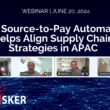The world of supply chains has evolved dramatically in recent years. From unexpected global disruptions to rapid technological advancements, supply chain leaders are navigating a constantly shifting landscape. On a recent episode of The Future Is… podcast, hosted by Honeywell’s Chief Marketing Officer Laura Kelleher, Torsten Pilz, Senior Vice President and Chief Supply Chain Officer at Honeywell, shared his perspective on these industry shifts. This article breaks down the key takeaways from their discussion and offers practical strategies to help supply chain professionals stay ahead in this dynamic environment.
Key Insights
1. The State of Supply Chains: A New Normal
Pilz pointed out that while supply chains have been through a period of upheaval, stability is starting to return. However, businesses won’t simply revert to old models. Instead, they must embrace a new reality—one where resilience takes precedence over pure efficiency.
2. Building Resilience: Reducing Single-Supplier Dependence
One of the biggest strategic shifts at Honeywell has been diversifying supply sources. A few years ago, nearly 90% of their supply chain depended on single-source suppliers. Today, that number has dropped to 60%. By spreading out supply sources, businesses can better shield themselves from disruptions and strengthen long-term stability.
3. AI’s Expanding Role in Supply Chains
Artificial intelligence is rapidly reshaping supply chain management. Honeywell has identified over 200 AI use cases, with early applications improving customer service and technical support. AI-powered tools, such as chat-based copilots, are already helping employees find information faster. Meanwhile, AI-driven analytics are enhancing procurement, planning, and logistics. Pilz emphasized that AI isn’t just a futuristic concept—it’s a competitive necessity. Companies that fail to adopt AI strategically risk falling behind.
4. Sustainability: A Business Imperative
With growing regulatory pressures and rising customer expectations, sustainability is no longer an option—it’s a must. Honeywell has committed to decarbonizing its operations by 2035, using its own technology to improve energy efficiency and cut emissions. The company has also set aside dedicated capital investments for sustainability initiatives, recognizing that an environmentally responsible supply chain isn’t just good for the planet—it’s also a smart business move.
5. The Future: Autonomous Supply Chains
Looking ahead, Pilz predicts that supply chains will become increasingly autonomous. At its core, supply and demand balancing is a mathematical challenge—one that AI, automation, and predictive analytics can solve with minimal human intervention. As these technologies advance, supply chains will become more data-driven, responsive, and efficient.
Actionable Strategies for Supply Chain Leaders
- Prioritize Resilience: Assess your supply chain risks and work towards reducing reliance on single-source suppliers. Consider dual sourcing and regional diversification.
- Adopt AI Strategically: Identify high-impact AI use cases that align with your business objectives, such as demand forecasting and logistics optimization.
- Commit to Sustainability: Take active steps to reduce your carbon footprint—whether through renewable energy, streamlined transportation, or sustainable materials.
- Encourage Cross-Functional Collaboration: Supply chain success requires strong coordination with finance, sales, R&D, and marketing. Build teams that foster innovation and transformation.
- Leverage Data for Smarter Decisions: Invest in data harmonization and enterprise-wide analytics to enhance visibility and improve forecasting accuracy.
The supply chain industry is at a pivotal moment, with resilience, AI, and sustainability shaping its future. Forward-thinking leaders must embrace these trends, ensuring their organizations stay competitive in a fast-changing world. As Honeywell’s journey illustrates, supply chain transformation isn’t a one-time fix—it requires long-term commitment, strategic investment, and a willingness to innovate. By staying adaptable and leveraging emerging technologies, supply chain professionals can build smarter, stronger, and more future-proof operations.
You can watch the full interview on www.youtube.com/watch?v=8yPYUG_BsG4









